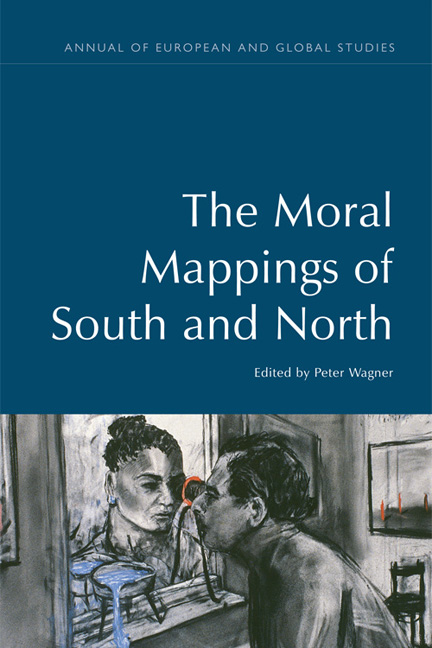Book contents
- Frontmatter
- Contents
- List of Figures
- Notes on the Contributors
- Acknowledgements
- 1 Finding One's Way in Global Social Space
- 2 Does the World Have a Spatio-political Form? Preliminaries
- 3 The BRICS Countries: Time and Space in Moral Narratives of Development
- 4 Russia between East, West and North: Comments on the History of Moral Mapping
- 5 Digging for Class: Thoughts on the Writing of a Global History of Social Distinction
- 6 North–South and the Question of Recognition: A Constellation Saturated with Tensions
- 7 On Spaces and Experiences: Modern Displacements, Interpretations and Universal Claims
- 8 The South as Exile
- Index
2 - Does the World Have a Spatio-political Form? Preliminaries
- Frontmatter
- Contents
- List of Figures
- Notes on the Contributors
- Acknowledgements
- 1 Finding One's Way in Global Social Space
- 2 Does the World Have a Spatio-political Form? Preliminaries
- 3 The BRICS Countries: Time and Space in Moral Narratives of Development
- 4 Russia between East, West and North: Comments on the History of Moral Mapping
- 5 Digging for Class: Thoughts on the Writing of a Global History of Social Distinction
- 6 North–South and the Question of Recognition: A Constellation Saturated with Tensions
- 7 On Spaces and Experiences: Modern Displacements, Interpretations and Universal Claims
- 8 The South as Exile
- Index
Summary
Framing the question
FROM A GLOBAL perspective, democracy seems to be nowadays the political regime that in discursive terms is implicitly considered the sole legitimate political order. Now, in contrast to the past, whenever democracy is not acknowledged as the only suitable regime to institute an order, either explicit ad hoc justifications have to be provided to show why temporarily democracy should not rule, or resistance to democracy is associated locally with resistance to domination. Paradoxically, at the moment in history when the reputation of democracy is at its best globally, a series of elements seem to suggest that its workings are in trouble (Rosich and Wagner 2016). Or, in other words, the constitution of a new global order that connects all human beings, arising as a response to the crisis of the previous order and possessing a commonly understood need to be democratic in its outlook, appears as tension-ridden. It is the first time in history that a socio-political ordering of the totality of human beings has to be normatively justifiable on democratic premises. Thus, it is an urgent task to collectively reconstruct socio-political thinking in the light of this present challenge.
Nevertheless, in both intellectual and historical terms the challenge itself is not new. Cosmopolitanism is the intellectual tradition that focuses on this problematique, though until very recently it did so only from a normative point of view and addressed it as a politicophilosophical project. However, Immanuel Kant, who remains the most representative thinker of this cosmopolitan project, did not believe that it was reconcilable with democracy (Kant [1784] 1989). From a historical point of view, the two ‘world’ wars of the twentieth century gave birth to two consecutive global political institutions, first the League of Nations and afterwards the United Nations. The failure of the Wilsonian utopia of ‘making the world safe for democracy’ after the First World War led the founders of the United Nations to envisage a much less ambitious political programme, putting human rights at the centre of their normative project and leaving to the principle of state sovereignty the political regime of member states.
- Type
- Chapter
- Information
- The Moral Mappings of South and North , pp. 18 - 50Publisher: Edinburgh University PressPrint publication year: 2017

